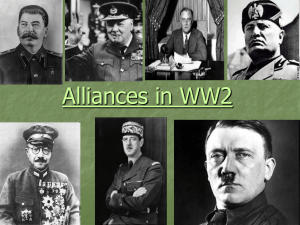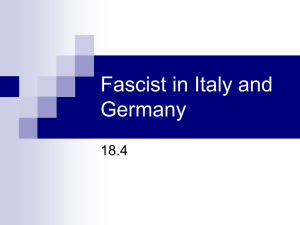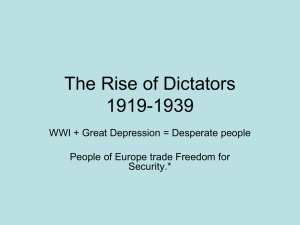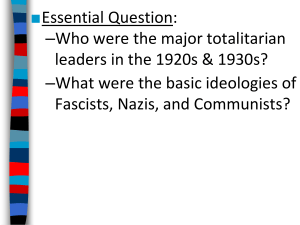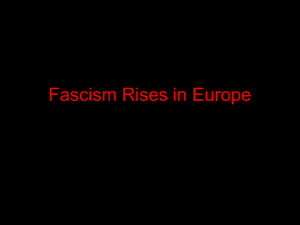Chapter 15 - Tori Hopkins
advertisement
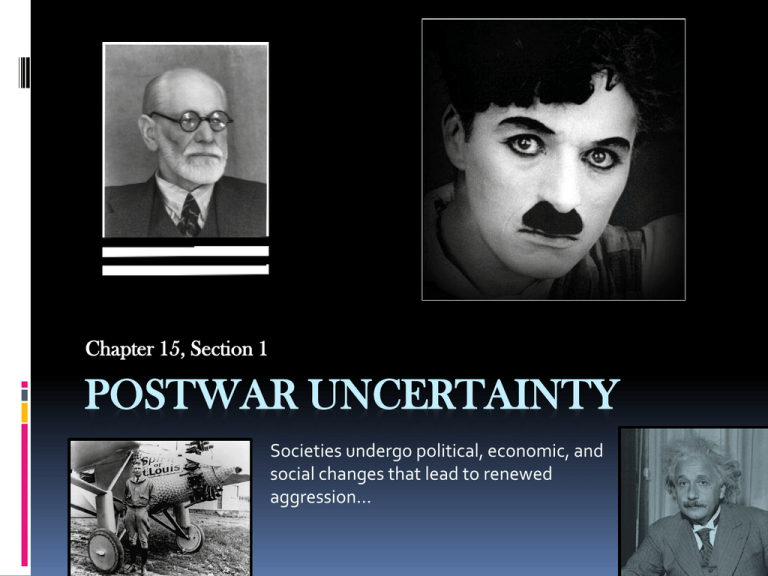
Chapter 15, Section 1 POSTWAR UNCERTAINTY Societies undergo political, economic, and social changes that lead to renewed aggression… I CAN Explain how the end of WWI led to deep & permanent changes in the human spirit. A New Revolution in Science Impact of Einstein’s Theory of Relativity Albert Einstein—offered radically new ideas in the field of physics Theory of Relativity—idea that space & time are not constant New ideas make world seem more uncertain than before Influence of Freudian Psychology Sigmund Freud—Austrian doctor with new ideas about the mind Claims that human behavior is not based on reason Literature in the 1920s: THE LOST GENERATION Impact of the War Suffering caused by WWI leads many to doubt old beliefs Writers reflect society’s concerns Thinkers React to Uncertain Times Philosophy of existentialism—no universal meaning of life Friedrich Nietzsche urges return to ancient heroic values Revolution in the Arts Artists Rebel Against Tradition Artists want to depict inner world of mind Cubism transforms natural shapes into geometric forms Surrealism—art movement that links dreams with real life Composers Try New Styles Composers move away from traditional styles Jazz—musical style that captures age’s new freedom Georges Braque, Woman with a Guitar, 1913. Musée National d'Art Moderne, Centre Georges Pompidou, Paris, France. An early example of Synthetic Cubism. Society Challenges Convention Women’s Roles Change Women take on new roles during WWI This work helps many win the right to vote In the 1920s, women adopt freer clothing, hairstyles, careers Technological Advances Improve Life Automobile Alters Society Cars improve after the war; become less expensive Lifestyles change Airplanes Transform Travel Charles Lindbergh is first to fly alone across the Atlantic Ocean Technological Advances Improve Life Radio & Movies Dominate Popular Entertainment (1920s) Commercial radio stations spread across the USA Motion pictures become major industry, art form Summarize 3-5 sentences hitting the highlights of the changes in life after WWI. A WORLDWIDE DEPRESSION CH. 15, SECTION 2 An economic depression in the USA spreads throughout the world and lasts for a decade I CAN… Understand and describe the causes & responses to the Great Depression. Postwar Europe (DO NOT Unstable New Democracies Fall of kingdoms, empires creates new democracies in Europe People have little experience with representative democracy Some form coalition governments-temporary, multi-party alliances Frequent changes in government create instability COPY) The Weimar Republic Democracy in Germany Weimar Republic—Germany’s democratic government formed in 1919 Government had serious weaknesses: high inflation, too many political parties that would not work together and inexperience in democracy Attempts at Economic Stability American loans help revive German economy The Weimar Republic Efforts at a Lasting Peace Germany and France sign treaty pledging no more war Many nations sign a similar agreement, the Kellogg-Briand pact Financial Collapse A Flawed U.S. Economy Weaknesses in American economy cause serious problems Wealth is distributed unevenly Most people are too poor to buy goods produced Factory owners cut back on production, lay off workers Farmers produce more food than people can eat Many farmers cannot repay loans & lose their land The Great Depression Economic Downturn Great Depression—long business slump of 1930s Marked by bank failures, loss of savings, unemployment A Global Depression USA’s economic problems create problems in other countries World trade falls sharply The World Confronts the Crisis Britain Takes Steps to Improve its Economy British voters elect coalition government, avoids political extremes Government brings about slow, steady economic recovery Preserves democracy by avoiding political extremes The World Confronts the Crisis Socialist Government Find Solutions Public works programs help Scandinavian countries recover Recovery in the USA Franklin D. Roosevelt—American president during the Great Depression New Deal—Roosevelt’s program of government reform to improve economy Not Everyone Keeps Democracy Some nations turn to political extremes to solve problems (ie Italy, Spain & Germany) 15.3 In response to political turmoil and economic crises, Italy & Germany turn to totalitarian dictators FASCISM RISES IN EUROPE Fascism Rises in Europe In response to political turmoil & economic crises, Italy & Germany turn to totalitarian dictators Fascism’s Rise in Italy New Political Movement Fascism is new, militant political movement Emphasizes nationalism & loyalty to authoritarian leader Mussolini Takes Control Italians want a leader who will take action Fascist Party leader, Benito Mussolini, promises to rescue Italy Italian king puts Mussolini in charge of government Il Duce’s Leadership Mussolini takes firm control of politics & economy in Italy Hitler Rises to Power in Germany A New Power Adolf Hitler—obscure political figure in the 1920s Germany The Rise of the Nazis Nazism—German brand of Fascism Hitler becomes Nazi leader, plots to seize national power Mein Kampf—Hitler’s book detailing beliefs, goals Hitler believes that Germany needs lebensraum (living space) Germans turn to Hitler when economy collapses Hitler Becomes Chancellor Hitler’s New Power Hitler is named Chancellor Turns Germany into a totalitarian state Uses brutal tactics to eliminate enemies Nazis take command of economy The Fuhrer is Supreme Hitler takes control over every aspect of German life Hitler Makes War on the Jews Nazis deprive Jews of rights, promote violence against them Other Countries Fall to Dictators World is Divided Most eastern Europe falls to dictators Only Czechoslovakia retains democratic government World splits into 2 camps: democratic & totalitarian TOPIC: YEARS OF CRISIS: AGGRESSORS INVADE NATIONS 15. 4 As Germany, Italy & Japan conquer other countries, the rest of the world does nothing to stop them Aggressors Invade Nations As Germany, Italy & Japan conquer other countries, the rest of the world does nothing to stop them Japan Seeks an Empire Militarists Take Control of Japan Military leaders take control of country Want to solve economic problems through foreign expansion Japan has investments in Manchuria, Chinese province 1931, Japanese army seizes Manchuria L of N protests actions; Japan withdrawals from League Japan Seeks an Empire 1937, Japan launches war on China European Aggressors on the March Mussolini Attacks Ethiopia L of N does not stop aggression Hitler Defies Treaty of Versailles 1935, Hitler begins rebuilding army (1st BIG defiance) 1936, Germany occupies Rhineland Britain urges appeasement, a policy of giving in to aggression Germany, Italy & Japan—the Axis Powers—form an alliance European Aggressors on the March Civil War Erupts in Spain 1931, a republic is declared in Spain 1936, General Francisco Franco leads rebellion Hitler & Mussolini help Franco & his fascists 1939, Franco wins Spanish Civil War Franco becomes Spain’s Fascist dictator Democratic Nations Try to Preserve Peace USA Follows an Isolationist Policy Isolationism—avoidance of political ties with other countries 1935, Congress Passes Neutrality Act The German Reich Expands Hitler plans to expand Third Reich—German Empire 1938, Hitler annexes Austria Hitler demands the Sudetenland from Czechoslovakia Czechs refuse, ask France for help Democratic Nations Try to Preserve Peace Britain & France Again Choose Appeasement Leaders meet at Munich Conference (1938) to settle Czech crisis Britain & France agree to let Hitler take Sudetenland 1939, Hitler still takes rest of Czechoslovakia Mussolini takes Albania; Hitler demands part of Poland Let the Games Begin! Nazis & Soviets Sign Nonaggression Pact 1939, Stalin & Hitler pledge never to attack one another


